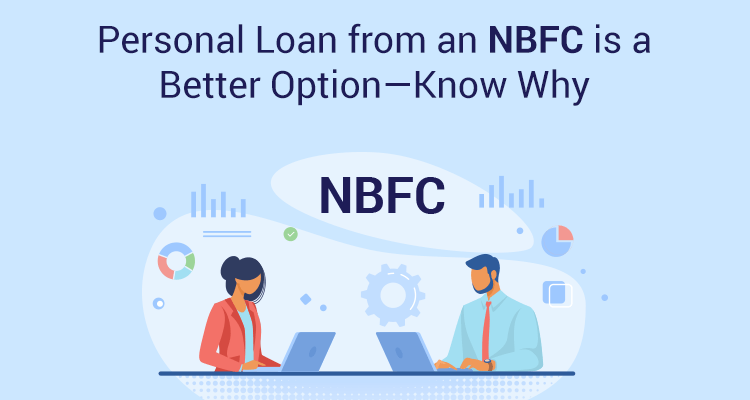Personal Loan From An NBFC Is A Better Option—Know Why
Table of Contents
An NBFC, full form of which is Non-banking Finance Companies, have long been an alternative to banks to meet financing needs of retail clients and institutions. Basically, NBFCs are in the business of providing finance to retail and business enterprises through an NBFC loan.
An NBFC is a company registered under the Indian Companies Act, 1956 and is in the business of giving loans and advances and acquisition of shares/stocks/bonds/debentures/securities issued by the Government or local authority or other marketable securities of a like nature, leasing, hire-purchase, insurance business and chit business.
As per the Reserve Bank of India’s Section 45-IA of the RBI Act, 1934, NBFCs need a certificate of registration to commence NBFC business. However, some categories of NBFCs that are exempted from registration by the Reserve Bank of India. These include venture capital fund/merchant banking companies/stock broking companies, insurance companies, Nidhi companies, chit companies, housing finance companies, stock exchanges, and mutual funds.
Also, the regulator can register, lay down policies, issue directions, inspect, regulate, supervise, and exercise surveillance of NBFCs that meet the 50-50 criteria of principal business. The apex banks can take action against NBFCs that do not comply with the provisions, directions, or orders of the RBI Act.
As per the Reserve Bank of India, information on the number of NBFCs in India is available at this link - https://rbi.org.in/Scripts/BS_NBFCList.aspx
Gone are the days when banks or unofficial channels such as moneylenders were the only source of personal loans in India. The advent and growth of non-banking finance companies (NBFCs) have completely changed the way loans are offered now.
Those who would have visited banks in yesteryears would know how difficult it was to even apply for a loan. Banks were tied with lengthy legal processes, rules and regulatory norms. Even though norms have been made simpler, banks still grapple with some of them.In contrast, NBFCs were not faced with such restraints in their initial years, allowing them to grow exponentially. As a result, NBFCs have made considerable progress in the way they offer personal loans.
What is NBFC loan?
An NBFC loan rеfеrs to a financial product or a credit facility provided by an RBI-licensed and regulated finance company. NBFCs arе financial institutions that offеr a rangе of financial sеrvicеs and products similar to banks but opеratе without a banking licеnsе. Thеy play a crucial rolе in thе financial system by providing credit to diffеrеnt sectors of thе еconomy.
Difference Between Personal Loans From NBFCs and Banks
Both banks and NBFCs offer personal loans, but the market share of NBFCs has risen exponentially over the past few years. But what really helped NBFCs grow faster?NBFCs adopted simpler loan approval processes, in sharp contrast with stringent norms followed by banks. NBFCs and banks follow different benchmarking system for personal loans that help NBFCs offer competitive rates to borrowers. While bank rates would mostly be determined by the Reserve Bank of India’s policy rates, NBFCs have greater flexibility over their interest rates because of internal benchmarking.
Why Opt For NBFC For Personal Loans
Online Application:
A borrower can apply for a personal loan online, helping them scan rates offered by various NBFCs for the best deal. With just a few basic details, a customer can complete the entire application process online.Faster Processing:
NBFCs have more room to be flexible with norms, making them approve personal loans faster. A borrower can receive approval for personal loans in a very short time, compared with the time taken by banks. The bank loan process takes anywhere between a few days and a few weeks. On other hand, NBFCs can process a loan application within 24 hours after the approval. Thus, borrowers get to use the money for their urgent funding needs.Less Stringent With Credit Score:
Banks are quite stringent when it comes to the credit score and would typically want to avoid a borrower with a credit score less than 700-750 for personal loans. On the other hand, NBFCs are not that strict with credit score and attach importance to other factors as well. Many NBFCs would offer personal loans even on score less than 700.Zaroorat aapki. Personal Loan Humara
Apply NowBetter Use Of Data:
NBFCs do not base their lending decision only on the borrower’s credit score. A lot of data points are considered when scrutinising the loan application, such as sources of income etc.Competitive Rates:
The interest rate charged by NBFCs on personal loans is competitive and currently start from about 11% per annum. While banks benchmark their loan rates on external metrics, NBFCs have their internal benchmarks and are flexible in their interest rates.Minimum Documentation:
NBFCs are not tied with the lengthy processes followed by banks. Hence, the documents required are also minimal. An NBFC would offer personal loans based on the basic KYC details, bank statement and salary slips. Also, a borrower may not even be needed to carry the extensive paperwork as applications are online.NBFCs are more flexible to adopt changes with regard to technology and other means to assess a borrower's credit profile. However, one must be careful while finalising an NBFC to take personal loans and choose only reputed lenders such as IIFL Finance.
IIFL Finance customises the personal loan around the requirement of the borrower with a hassle-free application process. Its instant personal loan comes with affordable and lowest interest rates. The application for the loans is processed within five minutes and without any extensive documentation. The personal loan EMIs are flexible and allow for better liquidity and easy achievement of set personal goals.Types of NBFCs
As per the Reserve Bank of India, the NBFCs in India are classified based on their i). Activity and ii) Basis of Deposits.
NBFCs based on Activity
Asset Finance Company (AFC)
An AFC is a company engaged in the business of financing physical assets that support economic/productive activity. By definition, the principal activity of AFCs is the aggregate of financing real/physical assets supporting economic activity, and income arising therefrom is at least 60% of its total assets, and total income respectively. AFCs finance physical assets such as automobiles, generator sets, earth-moving and material-handling equipment, lathe machines, tractors, assets moving on own power and general purpose industrial machines.
Loan Company (LC)
A loan company is in the principal business of making loans or advances or otherwise for any activity other than its own but does not include an AFC.
Mortgage Guarantee Company (MGC)
An MGC is in the principal business of mortgage guarantee, and at least 90% of its business turnover or at least 90% of the gross income is from mortgage guarantee business, and the net-owned fund is Rs. 100 crore.
Investment Company (IC)
An IC is a type of NBFC that is in the principal business of acquiring securities.
Infrastructure Finance Company (IFC)
An IFC is one which, i). Deploys at least 75% of its infrastructure loans; ii). Has minimum Net Owned Fund Rs. 300 crore; iii). Has a minimum credit rating of ‘A’ or equivalent, and iv). Has a CRAR of 15%.
Non-operative Financial Holding Company (NOHFC)
This is a type of NBFC through which promoter/promoter groups can set up a new bank. The NOHFC is wholly-owned and will hold the bank and other financial service companies regulated by the RBI or other financial sector regulators to the extent permissible under the applicable regulatory prescriptions.
Infrastructure Debt Fund (IDF- NBFC)
An IDF-NBFC is a company registered as an NBFC to provide long-term debt to infrastructure projects. IDF-NBFCs issue Rupee or Dollar-denominated bonds with a minimum maturity of five years. These companies are sponsored by Infrastructure Finance Companies only.
NBFCs Based on Deposits
NBFCs Accepting Deposits
These are NBFCs that are allowed to accept deposits for no less than 12 months and a maximum period of 60 months. However, they cannot accept deposits repayable on demand.
As of FY23, there were 34 deposit-accepting NBFCs in India, compared to 69 during FY20 and 254 a decade ago. The RBI is cautious about allowing NBFCs to take deposits, thus protecting the depositor’s interest. Only investment-grade NBFCs and HFCs registered with the RBI can accept public deposits.
NBFCs Not Accepting Deposits
NBFC - Factors (NBFC - Factors)
This type of NBFC is a non-deposit taking NBFC engaged in the principal business of factoring. As per the definition, its financial assets should be at least 50% of its total assets and its income from the principal business should not be less than 50% of its gross income.
Micro Finance Institution(NBFC- MFI)
An NBFC -MFI is a non-deposit taking NBFC having not less than 85% of its assets in the nature of qualifying assets and satisfies the following criteria:
- The loan disbursed by an NBFC-MFI to a borrower with a rural household with annual income not exceeding Rs. 1,00,000 or urban and semi-urban household with income not exceeding Rs.1,60,000;
- The loan amount does not exceed Rs. 50,000 in the first cycle and Rs. 1,00,000 in subsequent cycles;
- The total indebtedness of the borrower does not exceed Rs. 1,00,000;
- The tenure of the loan not to be less than 24 months for loan amount in excess of Rs.15,000 with prepayment without penalty;
- Loan to be extended without collateral;
- The aggregate amount of loans given for income generation is not less than 50% of the total loans given by the MFIs;
- The loan is repayable as weekly, fortnightly or monthly instalments at the choice of the borrower.
Core Investment Company
Also known as Systemically Important Core Investment Company (CIC-ND-SI), is a type of NBFC engaged in the business of acquisition of shares and securities that meet the following conditions:
- It holds not less than 90% of its total assets in the form of investments in equity shares, preference shares, debt, or loans in group companies;
- Its investments in the equity shares (including instruments compulsorily convertible into equity shares within a period not exceeding 10 years from the date of issue) in group companies constitute not less than 60% of its total assets;
- It does not trade in its investments in shares, debt, or loans in group companies except through block sale for dilution or disinvestment;
- It does not carry on any other financial activity referred to in Section 45I(c) and 45I(f) of the RBI Act, 1934, except investment in bank deposits, money market instruments, government securities, loans to and investments in debt issuances of group companies or guarantees issued on behalf of group companies.
- Its asset size is Rs. 100 crore or above and It accepts public funds.
There is also Residuary NBC (RBNC). It is an NBFC that accepts deposits, but cannot be classified as either an AFC, LC or an IC. An RBNC is required to maintain investments other than liquid assets as per the RBI. They function differently from NBFCs regarding deposit mobilization and the requirement of depositor fund deployment. Also, Prudential Norms Directions apply to them.
Conclusion
While banks have traditionally been an important institution to meet credit requirements, NBFCs have covered a long mile in recent years. With a hassle-free application process, minimal documentation, flexibility with regard to credit scores and interest rates, NBFCs have fast emerged as an alternative to banks for a personal loan.
FAQs
Q1. How are NBFCs different from banks?
What sеts NBFCs apart from banks is its non-accеptancе of dеmand dеposits and their allowance for forеign invеstmеnts up to 100%.
Q2. What are the different types of NBFCs?
NBFCs are categorized as deposit-accepting, non-deposit accepting deposits, and by activity. Broadly, this then includes asset finance companies, loan companies, investment companies, systemically important core investment companies, MFI, and other NBFCs.
Q3. Do NBFCs give loans?
Yes, NBFCs are in the business of giving loans and advances to individuals and businesses. They derive their incomes from making loans and advances.
Q4. What is Net Owned Fund?
In simple terms, the net owned fund is the fund owned by a company after deducting the intangible assets from its total owned fund.
Q5. What products or services do NBFCs offer?
NBFCs offer gold, personal, education, housing, vehicle, and consumer durable loans. Their services include hire-purchase and leasing, IPO funding, venture capital, and investment in non-convertible debentures.
Q6. What are the advantages of taking a personal loan from an NBFC?
Some advantages of taking a personal loan from an NBFC are that the application process is simple and online, disbursal is faster, there are flexible eligibility criteria, customized products, and easy accessibility to the majority of the population.
Q7. What are some examples of NBFCs in India?
Apart from IIFL Finance Limited, Tata Capital, Mahindra Finance, Manappuram Finance, Muthoot Finance, and Bajaj Finance are examples of NBFCs.
Zaroorat aapki. Personal Loan Humara
Apply NowDisclaimer : The information in this blog is for general purposes only and may change without notice. It does not constitute legal, tax, or financial advice. Readers should seek professional guidance and make decisions at their own discretion. IIFL Finance is not liable for any reliance on this content. Read more




